Book Review:
Annihilation
By Jeff VanderMeer
2014
C-
The Basics:
A volunteer team of specialists, made up of a biologist, a psychologist, an anthropologist, and a surveyor, have been sent to investigate the mysterious Area X, where all expeditions before them have either vanished or returned changed in some way. They soon discover an uncharted subterranean structure housing a strange ecosystem they’re grossly unprepared to study.
The Upside:
Some of the biologist’s flashbacks to her difficulties fitting into a professional hierarchy, a circle of friends, and even her marriage are nicely rendered in an understated way. And the defaulting of all the characters to female instead of male, as is so commonly considered the “normal” setting for characters in comparable sci-fi works who don’t exist for the purpose of sexual or romantic motivation of other characters, makes a welcome statement.
The Downside:
Much as I’d love to live in a world where all fictional characters, no matter how insignificant and unconsidered, default to female as often as male, it wouldn’t make those characters any less insignificant or unconsidered.
Regardless of gender, the expedition members of Annihilation remain largely unremarkable, thinly drawn, generic puppets of a plot and world that the author finds more interesting, which arguably might not be so terrible, if that plot and world weren’t just about as unremarkable and generic as the characters entombed within.
From a glance at the back cover, it’s clear that Area X is a place full of weird stuff that consumes people and is of interest to a less-than-forthcoming government agency. By journey’s end, we’ve learned that Area X is a place full of weird stuff that consumes people and is of interest to a less-than-forthcoming government agency. The space between is chiefly devoted to characters being staggeringly moved by just how weird the stuff in Area X is. Make no mistake, it’s quite weird, but not the sort of weird that provokes any questions with even the illusion of a possibility of meaningful answers.
The entire novel reads much like an early episode of Lost, mysterious for the sake of mysterious with no grander plan (there’s even a wild boar attack, a noisy monster in the forest, and a mysterious underground structure that periodically shoots pillars of light into the air), but without the character drama that made Lost engaging in spite of its aimlessness.
The one element of the Area X setup that could have worked, the ever classic story of change and madness working its way through a confined group in a strange place, is utterly sabotaged by the inability to know any of the characters well enough to be able to tell or care whether they’re changing from who they once were. In fact, the presentation of the group is willfully impersonal. We’re told almost immediately that two of the characters will die too quickly to be worth bothering with, and accordingly, they’re not bothered with. The characters are all referred to solely by job title, the habit of names crushed out of them during their specialized Area X training, a convention that’s clearly intended to be unsettling but instead produces such unintentional comedy gems as, “It’s just me, the biologist!”
Dialogue in general appears to be included under protest, a chore interrupting the flowery descriptions of Area X’s weirdness and natural majesty. All of the main characters spend most of the duration of the story under the arguable influence of some level of posthypnotic suggestion, which calls into question the validity of what little they say or do as an indicator of who they are.
Hypnosis is also used as a clumsy explanation for their adherence to the plot, and some of their other bad decisions, but there’s no Bioshock-esque “aha” moment when their actions suddenly make sense in a new context. Even the sudden absence of hypnosis doesn’t prevent our lead from trying to convince one of her colleagues that there’s a murderous traitor among the group, and then immediately trying to convince that same colleague to join her in walking into view of the sniper’s perch where said suspected murderous traitor is almost certainly waiting for them.
The biologist is the only character who’s given any level of humanization, and while some of it is affecting, haunting even, it’s almost always too little too late, every reveal teased and stretched out to just beyond the point where it matters, after the opportunity for it to infuse her present storyline with significance has passed.
Altogether a work of competent but uneven prose, with ambitions greatly exceeding its strengths.
Agree? Disagree? Comments are always welcome (just keep it civil, folks)! Or keep up with my fictional musings by joining me on Facebook, Pinterest, Twitter, or by signing up for email updates in the panel on the right!







